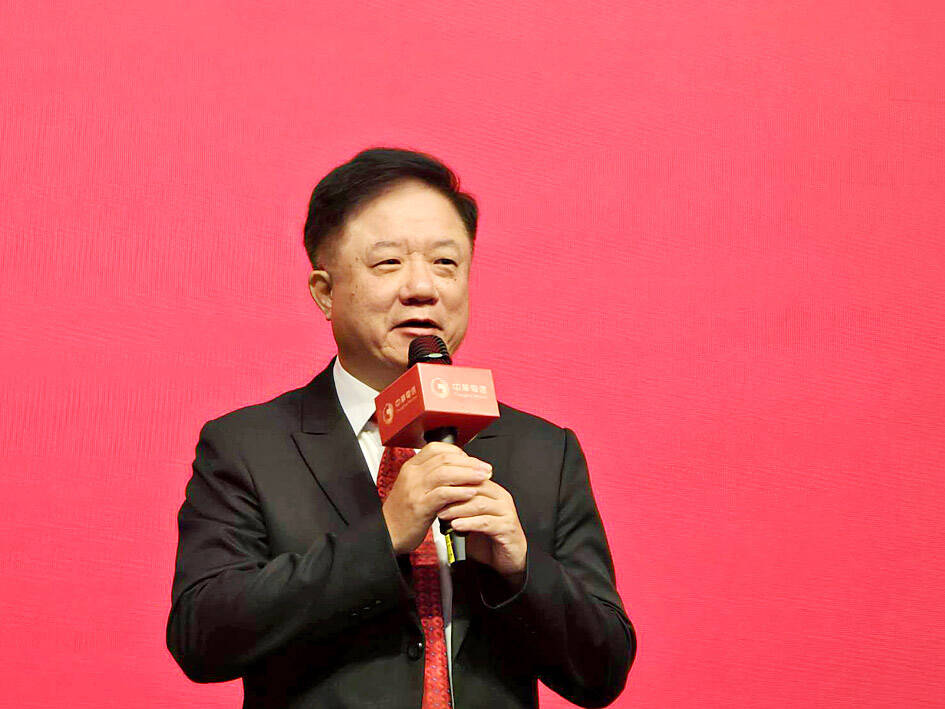Chunghwa Telecom Co (CHT, 中華電信) yesterday said it is boosting expenditure on deploying new undersea cables this year to as much as NT$2 billion (US$60.9 million) to meet customer demand, enhance operational resilience, and avert natural disasters and geopolitical risks.
The nation’s biggest telecom plans to install two new submarine cables — Southeast Asia-Japan Cable 2 (SJC2) and Apricot — in the first half of this year, Chunghwa Telecom chairman Alex Chien (簡志誠) said yesterday.
The company is also in talks with potential partners to deploy multiple new submarine cables, Chien said.

Photo: Wang Yi-hung, Taipei Times
“As long as those [undersea cables] connect Taiwan to Southeast Asia or Pacific nations, we would be interested in investing,” he said.
The SJC2 submarine cable system spans 10,500km, connecting 11 cable landing stations in Singapore, Thailand, Cambodia, Vietnam, Hong Kong, Taiwan, China, South Korea and Japan.
Apricot is a 12,000km cable system connecting Japan, Taiwan, Guam, the Philippines, Indonesia and Singapore.
In addition to new cables, the company is also allocating money to repair two damaged domestic undersea cables that connect Taiwan and Lienchiang County (Matsu). The cables were apparently damaged by Chinese ships last month, it said.
The company plans to allocate 25.2 percent more expenditure on the non-mobile segment this year, including the construction of submarine cables to support its business expansion into artificial intelligence (AI) and AI data centers, while spending on the mobile-related segment would shrink 13.3 percent, it added.
Overall, the company plans NT$32.36 billion of capital expenditures this year, up 12.3 percent from NT$28.82 billion last year.
In addition to undersea cables, CHT is mulling introducing more medium Earth orbit satellites and high Earth orbit satellite Internet services this year to help the government and large enterprises to protect their data when submarine cables are damaged, Chien said.
CHT last year inked agreements with OneWeb and SES to provide low and medium Earth orbit satellite services.
Net profit this year is forecast to shrink by 0.3 percent to 3.4 percent to between NT$45.3 billion and NT$46.72 billion compared with last year. Earnings per share would be in the range from NT$4.62 to NT$4.82, the company said.

‘FORM OF PROTEST’: The German Institute Taipei said it was ‘shocked’ to see Nazi symbolism used in connection with political aims as it condemned the incident Sung Chien-liang (宋建樑), who led efforts to recall Democratic Progressive Party (DPP) Legislator Lee Kun-cheng (李坤城), was released on bail of NT$80,000 yesterday amid an outcry over a Nazi armband he wore to questioning the night before. Sung arrived at the New Taipei City District Prosecutors’ Office for questioning in a recall petition forgery case on Tuesday night wearing a red armband bearing a swastika, carrying a copy of Adolf Hitler’s Mein Kampf and giving a Nazi salute. Sung left the building at 1:15am without the armband and apparently covering the book with a coat. This is a serious international scandal and Chinese

PERSONAL DATA: The implicated KMT members allegedly compiled their petitions by copying names from party lists without the consent of the people concerned Judicial authorities searched six locations yesterday and questioned six people, including one elderly Chinese Nationalist Party (KMT) member and five KMT Youth League associates, about alleged signature forgery and fraud relating to their recall efforts against two Democratic Progressive Party (DPP) legislators. After launching a probe into alleged signature forgery and related fraud in the KMT’s recall effort, prosecutors received a number of complaints, including about one petition that had 1,748 signatures of voters whose family members said they had already passed away, and also voters who said they did not approve the use of their name, Taipei Deputy Chief Prosecutor

UNDER ATTACK: Raymond Greene said there were 412 billion malicious threats in the Asia-Pacific region in the first half of 2023, with 55 percent targeting Taiwan Taiwan not only faces military intimidation from China, but is also on the front line of global cybersecurity threats, and it is taking action to counter those attacks, President William Lai (賴清德) said yesterday. Speaking at the opening of this year’s Cybersec Expo in Taipei, the president assured foreign diplomats and exhibitors that Taiwan remained committed to strengthening its defense against cyberattacks and enhancing the resilience of its digital infrastructure. Lai referenced a report from the National Security Bureau (NSB) indicating that the Government Service Network faced an average of 2.4 million intrusion attempts daily last year, more than double the figure

COUNTERINTELLIGENCE TRAINING: The ministry said 87.5 percent of the apprehended Chinese agents were reported by service members they tried to lure into becoming spies Taiwanese organized crime, illegal money lenders, temples and civic groups are complicit in Beijing’s infiltration of the armed forces, the Ministry of National Defense (MND) said in a report yesterday. Retired service members who had been turned to Beijing’s cause mainly relied on those channels to infiltrate the Taiwanese military, according to the report to be submitted to lawmakers ahead of tomorrow’s hearing on Chinese espionage in the military. Chinese intelligence typically used blackmail, Internet-based communications, bribery or debts to loan sharks to leverage active service personnel to do its bidding, it said. China’s main goals are to collect intelligence, and develop a